Kindergarten word problems? You heard that right!
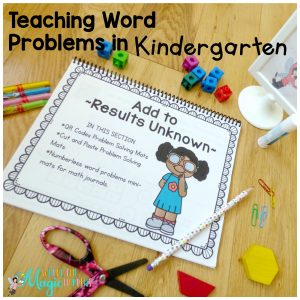
I have always thought that Kindergarten teachers have a special type of heart. You see them going around your building, and you just know that their soul is different than yours, don’t you think? Both of my boys had INCREDIBLE Kindergarten teachers. They are both wonderful people, and I am forever grateful that because of them, both of my boys had a great start in school.
I envy their patience! For sure!
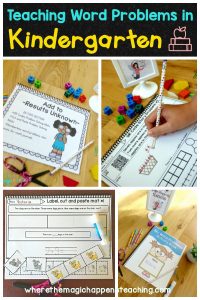
Since the topic today is word problems, let’s talk about five strategies that ALL the wonderful teachers in Kindergarten and first grade can use to get their students started on the right track!

Every year we wonder about how to fit ALL the curriculum in, and the truth of the matter is: we really are con artists at taking advantage of every minuet to teach. Teaching our Kindergarten students just the basic skills of computation and number sense takes So. Much. Time. Year after year it seems that there is more to do, and the school day might not look like it is enough. This should not be an excuse to let problem solving slip through the cracks. If your district does not provide you with a yearly pacing guide, in which you are showed how to integrate basic skills with problem solving, then you and your team need to have a nice lunch at Panera during the summer and do so. Some important things to discuss are:
- How to spend the math instructional time
- How to integrate arithmetic and problem solving skills
- How long and what basic skills are needed for Kindergartners before introducing word problems.
Also, best math practices say that word problems should be taught along math skills, rather than in isolation. This is a compilation of basic math skills to teach your Kindergarten students before introducing word problems:
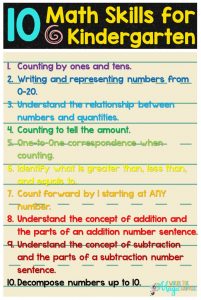
Spend at least half of the year teaching these skills to FULL mastery because:
Most of the mistakes related to word problems that our older students make, are due to miscounting!

Have you heard about relational thinking? I don’t mean to sound like I textbook, I promise. But Kindergarten teachers are SO lucky to be able to touch base on this matter first. Before anyone else!
Relational thinking helps our students discover the relationships between quantities rather than finding
the result of operations.
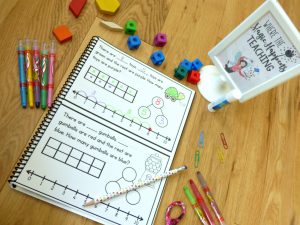
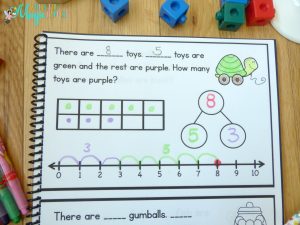
Some students will come to school with a greater disposition toward relational thinking than others.
Students with a relational thinking edge, will have a habit of thinking before acting.
They will take the time to truly understand their word problems instead of computing right away. Relational thinking involves more than just using strategies; it involves making strategic decisions!
Now, go to your small group table and see: some of your students will invent their strategies. They will use counters or fingers, and over time these strategies will become more mental.
So how to teach relational thinking to kindergarten students? After spending the first part of the year teaching basic number sense and arithmetic skills, using numberless word problems is the best way to show your students the relationships in word problems. Even students who may not be drawn to take the time to understand the relationships between the quantities, will have no choice but to think mathematically!
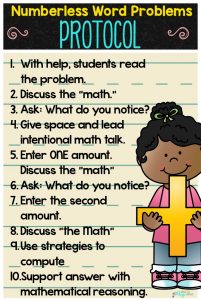

Kindergarten (and other grades too) should be all about the hands-on use of manipulatives and direct modeling. The MOST important thing being able to directly model the action or relationship described in each word problem.
Bar models, ten frames, number bonds, chips, counters, snap cubes, are just a few ways.
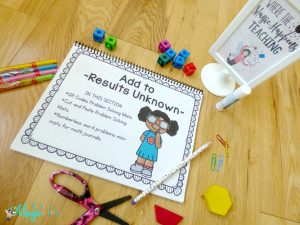
There is a stigma about the use of manipulatives as children move from K to 1st, to 2nd. Why? 🤷♀️Let’s move the kids forward by providing them with what they need in order to be successful, don’t you think?
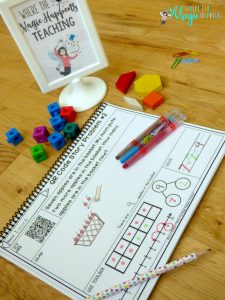
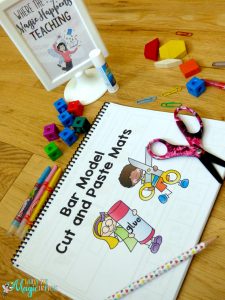
Cutting and pasting is a very hands-on activity, when introducing bar models with word problems in Kindergarten. It is VERY important to teach number bonds first with part-part-whole relationships.




Many students in Kindergarten come to school with great language experiences. Others don’t, due to many other factors. Make sure that when you are writing your word problems, they are easy to understand, that the language is simple, and that the focus is on the action and relationship of the situation.
The same goes with the reading portion of it. Make it accessible, and do the reading or provide students with QR codes for listening if they are attempting to work independently!

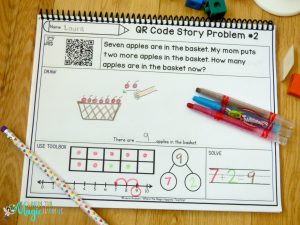
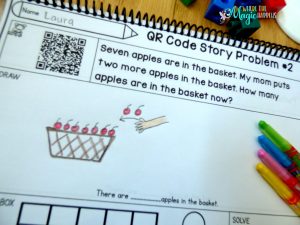

When practicing word problems, make sure to mix it up a bit. If you present your students with the same type of word problem on a page, they might be challenged by the first problem on the page, but will soon realize that the same procedure can be used for all the others. They will not be using their relational thinking, but doing a routine application of the same algorithms.
And we don’t want that, so go ahead and mix it up!
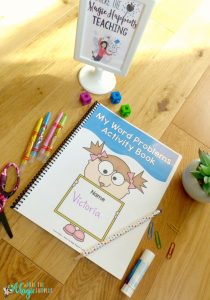
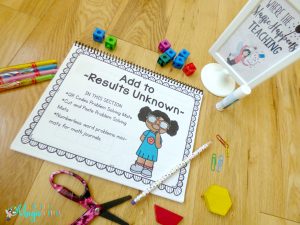
If you are interested, you can purchase my Word Problems for Kindergarten from my TPT store. And if you would like a sample, you may complete the form below!
Thank you for reading, and sticking with me!
Until next time,

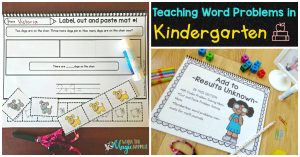
Hi, how can avail these word problem activities? May I know if I can get any few soft copies?
Appreciate if I can hear from you soon.
Thank you so much.